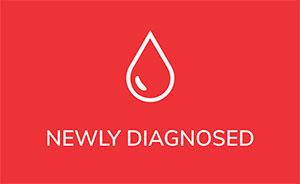We have learned so much about chronic lymphocytic leukemia (CLL) in the past decade, but sometimes everyday medical practice in our communities is slow to catch up on all the latest advances in research and treatment.
At the annual meeting of the American Society of Hematology (ASH) 2019, our own Dr. Brian Koffman interviewed Dr. Chaitra Ujjani, a medical oncologist at Seattle Cancer Care Alliance, about real world prescribing for CLL.
Standard chemotherapy has been a cornerstone of cancer treatment for a long time, and it attacks all rapidly growing cells in general. Chemoimmunotherapy such as FCR (fludarabine-cyclophosphamide-rituximab) combines standard chemotherapy drugs with antibodies that recognize a marker specifically found on the surface of B cells (CD20).
Newer targeted therapies are drugs that target one or more specific proteins that cause cells to become cancer. Several new targeted therapy drugs for CLL have been approved in recent years including ibrutinib, acalabrutinib, venetoclax, and PI3K inhibitors such as idelalisib.
Takeaways:
- Experts who specialize in CLL are very knowledgeable about the latest advances in the treatment of CLL, while community physicians may not always be aware of new research or updated treatment guidelines
- Data from large clinical trials suggest that patients do better when they are treated with targeted therapies compared with chemoimmunotherapy.
- In the real world at community practices, a lot of patients are still being treated with chemoimmunotherapy or in some cases even standard chemotherapy, which is surprising given that we have studies showing that these treatments are probably not the best choice for everyone.
- This highlights the need to educate both health care professionals and patients about the available treatment options.
Conclusions:
We now know so much more about CLL and its biology that it usually doesn’t make sense to treat with standard chemotherapy anymore. While chemoimmunotherapy is widely used, targeted therapy drugs can be much more effective. The best therapeutic option for you will depend on several factors including your age, overall health, prognostic factors such as mutation status, and your personal preferences. If you’re not sure about a diagnosis or treatment plan, never be afraid to ask for a second opinion.
Here at the CLL Society, to help you receive the best care, we encourage the use of:
- Expert care
- Clinical trials
- Novel agents, if appropriate
Experts who specialize in CLL are often the most knowledgeable and have the most experience treating patients with CLL. Having an expert as part of your health care team can help you live longer. We believe expert care is so critical that we offer our Expert Access™ Program to help connect patients with CLL experts.
Please enjoy this brief interview with Dr. Ujjani from December 2019 at ASH in Orlando, FL.
Take care of yourself first.
Ann Liu, PhD

















